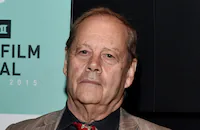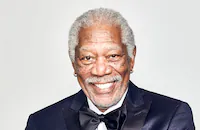Driving Miss Daisy

Brief Synopsis
Cast & Crew
Bruce Beresford
Jessica Tandy
Morgan Freeman
Dan Aykroyd
Patti Lupone
Esther Rolle
Film Details
Technical Specs
Synopsis
The relationship between a 70-year-old Southern woman and her black chauffeur, spanning 20 years.
Director

Bruce Beresford
Cast

Jessica Tandy

Morgan Freeman
Dan Aykroyd
Patti Lupone
Esther Rolle
Ashley Josey
Clarice F Geigerman
Lynne Stewart
Joann Havrilla
Alvin M Sugarman
June Christopher
Ruth Silveira
Carolyn Gold
Ray Mckinnon
Arnold Turner
Jack Rousso
Indra A Thomas
Eugene Lee
Muriel Moore
Archie Hahn
Gabriela Benackova
Bob Hannah
Crystal Fox
Kristen Mcgary
Leigh French
Royce D Applegate
Sylvia Kaler
Felton Perry
Fred Faser
Gregory Snegoff
Crew
Lester Allen
Louis Armstrong
Bowen Astrop
Sandina Bailo-lape
Lynn Barber
Jeff Becker
Tom Bellfort
Benjamin Beresford
Derek Best
Wren Boney
Gloria S Borders
David Brown
Gary L Buckles
Ronni Chasen
Don E Cochran
Andrew M Comins
Gloria Cooper
Gloria Cooper
Melissa Dietz
Robert Doudell
Robert Doudell
Antonin Dvorak
Antonin Dvorak
Jake Eberts
Martha Elcan
Sam Emerson
Michael Fedack
Ella Fitzgerald
Katterli Frauenfelder
David J Frederick
Clare Freeman
Hank Garfield
Nanette Guidebeck
Tom S Gunter
Jeanne M Hall
Kevin Haney
Karen Harding
Robin Harlan
Charles K. Harris
Annette Haywood-carter
Colleen Hess
Robert Hill
Tim Holland
Paul Huggins
B J Hughes
Matthew Iadarola
Philip Ivey
Ronald Jacobs
Peter James
Peter James
Joann Jarvitz
Kristine Kearney
Robert Kempf
Victor Kempster
Eartha Kitt
Tony Kupersmith
James Laclair
Robert Edwin Lee
Barry Levine
Phil Lido
Donald Likovich
Danny Mabry
Elizabeth Mcbride
David Meistrich
Susan E Michey
Lois Middlebrooks
Michael Minkler
Greg Morse
Charlene Murray-rose
Jeremiah O'driscoll
John Oliveira
Russell Paris
Cindy Parker
J L Parker
Matt Patterson
Les Peel
Les Peel
Letha Perkins
Laura Perlman
Marsha Perloff
Wendy Price
Bob Putynkowski
Steven Ramirez
Stroke T Renigade-patterson
Jay Rifkin
Manlio Rocchetti
Erich Roland
Andy Rovins
Bruno Rubeo
Crispian Sallis
Patricia Sammons
Judith Schefke
Tom Shaffer
Katherine Shaw
B J Shelley
Bob Shelley
Keith Sherer
David Sinrich
David Slusser
Michael Smith
Vera Smith
Phil Spring
Tony Springer
Eric P Steckler
Phillip Steuer
Sean Swint
Indra A Thomas
Alfred Uhry
Alfred Uhry
Alfred Uhry
Irving Vendig
Mark Warner
Leon Watkins
Deek Watson
Jonathan M. Watson
Elyn S Wright
Teresa M. Yarbrough
Karen Young
Lili Fini Zanuck
Richard D. Zanuck
Hans Zimmer
William Zullo
Film Details
Technical Specs
Award Wins
Best Actress
Best Adapted Screenplay
Best Makeup
Best Picture
Award Nominations
Best Actor
Best Art Direction
Best Costume Design
Best Editing
Best Supporting Actor
Articles
Driving Miss Daisy
Driving Miss Daisy also brought Tandy a Best Actress Oscar, making her the oldest recipient of an Academy Award (she was five months older than previous record holder George Burns who had won a Best Supporting Actor Oscar for The Sunshine Boys in 1975). Freeman was nominated as well, for Best Actor, but lost to Daniel Day-Lewis (My Left Foot). In all, Driving Miss Daisy was nominated for nine awards but most of the talk that year was about the lack of one nomination.
Director Bruce Beresford, a member of the Australian "New Wave" directors, was in good company with Dead Poets Society's Peter Weir and first gained acclaim with Breaker Morant (1980), an unflinching account of a military murder trial during the Boer War. Beresford would garner another success with Tender Mercies (1983), starring Robert Duvall. Making Driving Miss Daisy, however, would prove to be the most difficult challenge. As Beresford explained it, "When we were trying to get the money together for the film, one reason that was consistently given for not investing in it was that everyone kept saying no one could direct it well enough to entertain an audience for 100 minutes essentially watching three people chatting in the kitchen." When Driving Miss Daisy became not only a massive box office success, with global audience appeal, and the winner of the Best Picture Oscar, it became glaringly obvious that a major oversight had occurred: Beresford had not even been nominated for Best Director. It has happened only twice before in Oscar history, a Best Picture win without a Best Director nomination for the films, Wings (1927) and Grand Hotel (1932). Beresford later mused: "So when the film was a big success, I thought now at least they will see that maybe it was directed reasonably well because it was entertaining. But then everyone sort of said to me, 'Oh well, the direction was non-existent. It doesn't look like there was any effort involved at all.' Ultimately though, it didn't really matter." Beresford's love for the project superseded the desire for any awards, or any compensation of any kind: he did not receive any pay for the work, because, in his own words, "Nobody wanted to finance it. Finally they said, 'We'll give you the money provided you take no director's fee.' I agreed because I had such faith in the product. I knew it was going to be a wonderful film."
Alfred Uhry, writer of the screenplay, also authored the Pulitzer-winning play on which the script was based. An Atlanta-based writer, Uhry also penned Mystic Pizza (1988), the film that launched Julia Roberts' career. He would earn an Oscar for Best Adapted Screenplay for Driving Miss Daisy. Supporting actors Dan Aykroyd, Patti LuPone, and Esther Rolle all took advantage of opportunities to digress from their usual roles. Aykroyd, of Saturday Night Live fame and The Blues Brothers (1980), earned a Supporting Actor nomination for his unusual turn into drama with Driving. Singer/Actress LuPone took a break from theatrical performances and musical recordings to perform a role that Uhry reportedly created just for her in the film version. Rolle is best remembered as the mother from the 70s television sitcom Good Times. The two leads, Tandy and Freeman, were lauded for their effective portrayals of realistically aging over a twenty-five year time period. Naturally, cosmetics helped - the film did win for Best Make-up, but it was the actors' performances that made the progression of time so convincing. In an infinitely memorable quote, Morgan Freeman explained the secret of his success in a later interview: "Years ago my acting instructor told me that in order to play age well, you had to imagine that your testicles are made out of Christmas balls." Young actors, take note.
Producer: Richard D. Zanuck, Jake Eberts
Director: Bruce Beresford
Screenplay: Alfred Uhry
Art Direction: Victor Kempster
Cinematography: Peter James
Editing: Mark Warner
Music: Hans Zimmer
Cast: Morgan Freeman (Hoke Colburn), Jessica Tandy (Miss Daisy Werthan), Dan Aykroyd (Boolie Werthan), Patti LuPone (Florine Werthan), Esther Rolle (Idella).
C-99m. Letterboxed. Closed captioning.
by Eleanor Quin

Driving Miss Daisy
Quotes
Trivia
Miscellaneous Notes
Released in United States Winter December 13, 1989
Released in United States December 20, 1989
Released in United States December 11, 1989
Released in United States February 1990
Shown at Berlin Film Festival (in competition) February 9-20, 1990.
Based on Uhry's hit 1987 Off-Broadway play, which originally starred Dana Ivey and Morgan Freeman. (Their roles were subsequently played by Frances Sternhagen and Earl Hyman.) "Driving Miss Daisy" won the 1988 Pulitzer Prize for Drama.
Began shooting May 15, 1989.
Completed shooting July 5, 1989.
First film under The Zanuck Company.
Released in United States December 11, 1989 (World benefit premiere for the Food For All Seasons Foundations in Washington DC December 11, 1989.)
Released in United States February 1990 (Shown at Berlin Film Festival (in competition) February 9-20, 1990.)
Released in United States Winter December 13, 1989
Released in United States December 20, 1989
Voted Best Picture of the Year (1989) by the National Board of Review.














